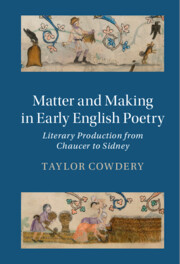Book contents
- Matter and Making in Early English Poetry
- Cambridge Studies in Medieval Literature
- Matter and Making in Early English Poetry
- Copyright page
- Contents
- Acknowledgments
- Abbreviations and Editorial Conventions
- Introduction
- Chapter 1 Words and Deeds in Chaucer
- Chapter 2 Gower and the Crying Voice
- Chapter 3 Hoccleve and the Force of Literature
- Chapter 4 Lydgate and the Surplus of History
- Chapter 5 Copy and Copia in Skelton
- Chapter 6 Wyatt’s Grace
- Epilogue
- Notes
- Bibliography
- Index
- Cambridge Studies in Medieval Literature
Chapter 4 - Lydgate and the Surplus of History
Published online by Cambridge University Press: 15 June 2023
- Matter and Making in Early English Poetry
- Cambridge Studies in Medieval Literature
- Matter and Making in Early English Poetry
- Copyright page
- Contents
- Acknowledgments
- Abbreviations and Editorial Conventions
- Introduction
- Chapter 1 Words and Deeds in Chaucer
- Chapter 2 Gower and the Crying Voice
- Chapter 3 Hoccleve and the Force of Literature
- Chapter 4 Lydgate and the Surplus of History
- Chapter 5 Copy and Copia in Skelton
- Chapter 6 Wyatt’s Grace
- Epilogue
- Notes
- Bibliography
- Index
- Cambridge Studies in Medieval Literature
Summary
This chapter considers John Lydgate’s Fall of Princes, a poem in the mode of a universal chronicle that Lydgate composed for Humphrey, duke of Gloucester, during the 1430s. I suggest that, in Lydgate’s historical poetry, and particularly in the Fall, the poet fixates upon the “surplus” of literary matter that the forms of his poetry leave out or exclude. In its most immediate sense, this “surplus” consists of those aspects of the historical record that Lydgate cannot, or will not, repeat within his poetry. But in a broader way, it also figures Lydgate’s view of history itself, which he feels is too vast, and too self-conflicted, to represent in full. I begin by examining Lydgate’s debts to the artes poetriae manuals, the formes fixes tradition, and practices of monastic historiography, all of which lie behind his belief in the surplus and shape his use of the idea. I then consider how the surplus, both as a term and as a concept, motivates the poetics of the Fall, and in particular, the pointed but ambiguous way that it speaks to matters of contemporary political concern to Humphrey of Gloucester.
- Type
- Chapter
- Information
- Matter and Making in Early English PoetryLiterary Production from Chaucer to Sidney, pp. 111 - 138Publisher: Cambridge University PressPrint publication year: 2023

